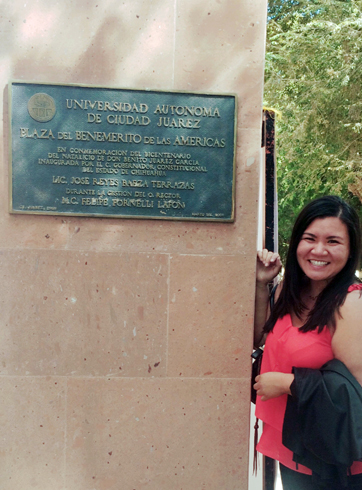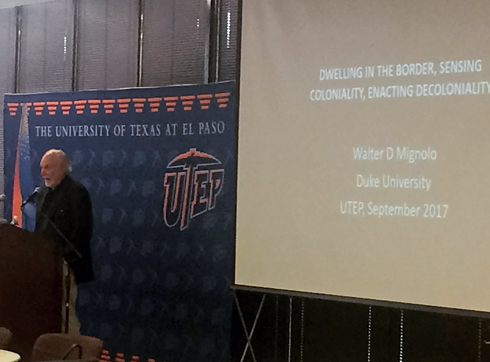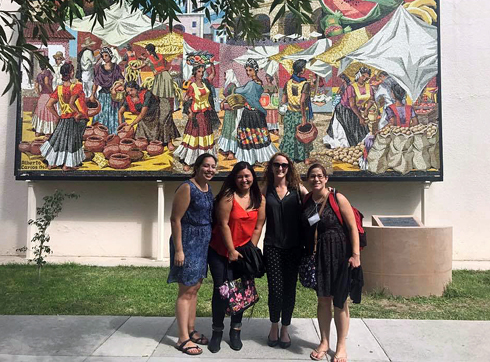Associate Research Fellow Elaine Sandoval presents at the Inter-American Symposium on Ethnographic Research in Education, Ciudad Juárez, México

Elaine Sandoval after presenting at the Universidad Autonóma de Ciudad Juárez, México
The theme for the 14th Inter-American Symposium on Ethnographic Research in Education was “Crossing Borders: Disciplines, Languages/Cultures, and Spaces/Places.” In accordance with this timely theme, the conference was hosted September 21 and 23, 2017, at the University of Texas at El Paso, US, and September 22 at the Universidad Autonomá de Ciudad Juárez, Mexico. Going beyond the merely metaphorical meaning of the conference theme, the attendees together crossed the short distance across the border (Ciudad Juárez is easily visible from El Paso), getting a visceral experience of those who perform such acts of mobility every day. This also gave the opportunity to welcome participants from across the Americas to participate in spite of border regulations.
Moreover, the conference was simultaneously held trilingually (in English, Spanish, and Portuguese), with panel chairs and participants constantly interpreting for others with differing language abilities in their vicinity. It was the first time I have been able to participate in such a deliberately multilingual space with such constant shared effort to bring everyone into the same understandings. One memorable workshop I participated in was based around the publication of the book Comparing Ethnographies: Local Studies of Education Across the Americas (Anderson-Levitt and Rockwell, 2017, AERA). To emulate the experience of the included authors – who had co-authored and worked together across national and linguistic borders – we participated in discussions around the way different terms are translated and understood differently in a variety of linguistic, national, and academic contexts. Some such words discussed were “intercultural,” “transcultural,” and “bilingual,” and participants all left with an appreciation for the challenges but also rich possibilities presented by working with academics from varying disciplinary and institutional backgrounds.

Keynote Speech by Walter Mignolo: “Dwelling in the Border, Sensing Coloniality, Enacting Decoloniality”
One of the world’s foremost thinkers on border thinking, Walter Mignolo, delivered the keynote address on “Dwelling in the Border, Sensing Coloniality, Enacting Decoloniality.” Mignolo pointed out the extent to which his own thinking was influenced by the groundbreaking work of Gloria Anzaldúa, reflecting the importance of grounding intellectual work with lived experiences of living on the borders, as well as the particularly fraught history and significance of the US-México border. Mignolo focused on the potential of decolonizing in education, highlighting the importance of liberating subjectivities and on rendering visible and dismantling the colonial matrix of power (cf Anibal Quijano). He shared various decolonizing education projects throughout the Americas as models as well as to highlight the various challenges facing such work.

Elaine Sandoval with colleagues at the Universidad Autonóma de Ciudad Juárez, México
My own presentation was in Ciudad Juárez, México, on the panel “Theoretical and Pedagogical Innovations in Educational Ethnography,” and I shared findings from my own fieldwork with the Alma Llanera music education program of El Sistema in Venezuela, which I conducted between September 2016-May 2017. In a presentation titled “New Borders and Border Crossings in the Pedagogy of Música Llanera: An Ethnographic Study of the Alma Llanera Music Education Program in Venezuela,” I argued that ethnographic methods in classrooms allow us to make note of the continuing agency of individual music teachers even as their pedagogy crosses institutional borders. Despite having to perform border crossings moving from the oral transmission methods traditional to música llanera to a formalized institution, as well as moving from a locally-rooted folkloric tradition into a space dominated by classical Western music, teachers demonstrate constantly negotiating their own pedagogical preferences and local cultural identities within the power structures of institutions. My panel included Spanish-language presentations from scholars from Argentina and Mexico, and our presentation and discussions were constantly informally translated thanks to a shared effort between presenters, our chair, and our audience.
While I did not meet any other music scholars participating in the conference, I received great engagement with and support of my work and feedback from scholars working in anthropology and in education. I am excited for new methodological ideas that I can apply to my work, and to have met a new academic community with shared social justice commitments, especially to working with those often made peripheral by various epistemological, linguistic, and regional borders.




